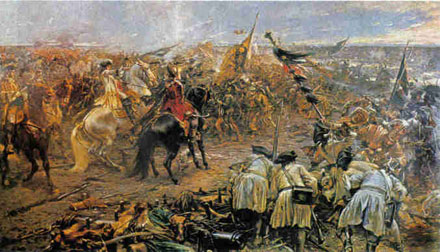*Image Credit: Wikipedia For well over a decade, the Ottoman kingdom and Habsburg dynasty had sent armies into the fields of central Europe. Having barely survived the Battle of Vienna, the Habsburgs had managed to secure the Austrian borders and fight back toward Belgrade by 1688 — which the Ottomans would reverse by capturing the modern capital of Serbia just two years later. Desperate to push the Turks out of Europe, Prince Eugene of Savoy led the Austrian army and surprised the Ottomans at the Battle of Zenta on September 11, 1697. With victory secured, the Habsburg royal family had leverage for negotiations that would set new borders for both empires in 1699. Two months before the battle would begin, Prince Eugene of Savoy was broke. At the head of army of more than 70,000 Austrians, Germans and Hungarians, he borrowed money in order to pay the wages of his soldiers and provide medical care. Drawing his disparate armies together, Eugene decide to push towards Petrovaradin to draw Sultan Mustafa II and the Ottomans out of Belgrade. Mustafa, with an eye toward launching an assault on Szeged, refused Eugene’s proposals all through the month of August and moved his army northward. Itching for a fight, the Imperial army trailed behind their enemy. The Ottomans, focused on capturing the fortress Mustafa had in mind, could not be tempted to begin combat on any terms but their own. When the Imperial Cavalry managed to seize Cafer Pasha, a high commander of the Ottoman army, Mustafa merely abandoned his plans and turned his soldiers toward Timisoara. Eugene, learning of the plans from scouts, directed his men toward the Tisa River in order to create a conflict where Mustafa would suspect none. Just outside of Zenta, the Imperial Army lie in wait as the Ottoman force moved across the river. As a significant portion of the Turkish soldiers began to settle into camp on the other side of the bridge, Eugene ordered his artillery to open up on the Ottoman positions. Within minutes, Imperial soldiers had encircled the confused enemy army and begun closing in around them. Moving swiftly in from the left side of the Imperial line, soldiers pierced the Ottoman defense and managed to cut off access to the bridge. Unable to retreat, the Turkish force now faced a slaughter. With relentless pressure, the Austrians methodically broke down the defenses surrounding the Turkish camp and pursued enemy soldiers until more than 20,000 were dead — not to mention 10,000 drowned when the waters of the Tisa became too much for them to swim across. Eugene’s army, by contrast, had lost just 500 men and managed to secure the Ottoman war chest and 87 cannons, as well as a handful of camels. Utterly crushed at the Battle of Zenta, Mustafa led his armies away from the field. Two years later, the Austrians pulled him to the table and secured the Treaty of Karlowitz, removing the Ottomans from Transylvania and Bosnia in the process.
September 11, 1697 CE – Habsburg Armies Inflict Heavy Losses on the Ottoman Empire at the Battle of Zenta
*Image Credit: Wikipedia For well over a decade, the Ottoman kingdom and Habsburg dynasty had sent armies into the fields of central Europe. Having barely survived the Battle of Vienna,…
500
